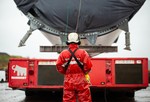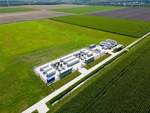09/18/2009
Product Pick of the Week - Meter to assist in managing wind farm power
Wind energy and hydropower have a see-saw-like relationship: When one goes up the other goes down. But the Bonneville Power Administration is hoping a small device that looks like a model rocket and weighs a few pounds can help ease the tricky synergy.
BPA on Wednesday installed an anemometer to help the power-marketing agency better forecast oncoming wind at the Horse Heaven substation just west of Paterson. The white device with a black propeller on its nose was attached to a bar extended outward about 6 feet off the top of the substation's 70-foot communications tower.
The data it collects will be linked with 13 other anemometers scattered throughout the region to forecast approaching wind. If BPA has a tighter timeframe of when wind meets wind farms, it can be better prepared to handle the often-sudden influx of wind-generated energy.
Because wind is intermittent, it can be difficult for BPA to prepare for gusts that suddenly, and sometimes rapidly, send hundreds of megawatts of electricity onto the grid. In order to balance the flood of wind-generated electricity, BPA slows hydropower generation at dams.
That causes water to rise behind the dams, reducing the amount of power that can be generated. When the wind begins to wane, that water may have to be rapidly released to compensate for the drop in wind-generated energy.
It's a balancing act that can be difficult to negotiate. "Basically, you have to spontaneously react to it," said BPA spokeswoman Katie Pruder.
"We have to hold a large amount (of water) in reserve to be ready for the ups and downs."
If BPA can better forecast and monitor wind, it should give operators and power schedulers more time to react to sudden surges and decreases of wind-generated electricity. That would allow BPA to store less water, which should result in more hydroelectricity production.
"If we hold less water in reserve, (more energy) can be sold on the open market, which can lower rates," Pruder said.
John Lodahl, who climbed the 70-foot tower Wednesday and installed the anemometer, said the wind meters eventually will allow BPA to receive updates on wind conditions every two seconds, or nearly in real time. "It's going to take (the data) and actually plot the wind," he said.
It took Lodahl about an hour to install the meter on the communication tower, which sat inside the fenced-off substation, where between 115,000 and 230,000 volts of electricity surge through tall lines and a constantly humming transformer. He was helped by Max Holder. With Holder on the ground and Lodahl perched atop the tower, the pair used an antiquated technique to install 21st-century technology by working a pulley system to move bars, tools, clamps and the anemometer to the top of the tower.
Inside the substation's lone building, Holder installed a data logger, which will relay the information gathered by the anemometer to a central BPA database. Pruder said BPA employees then will use the data to determine how much power will be needed for the next energy load and where that energy will come from. It's during this process that BPA encounters large swings of unanticipated wind energy, which causes employees to scramble to adjust the hydropower system accordingly.
Pruder said the anemometers and the accompanying data logger system should be fully functional by September 2010. BPA currently has more than 2,200 megawatts of wind energy connected to its grid, although usually just a fraction of that is generated at any given time. On Aug. 6, more than 2,000 megawatts of wind energy pulsed through BPA's grid, which set a record. Typically, wind energy is generated at about a third of its capacity. An average megawatt can power about 700 homes annually in the Northwest.
For more information please contact Trevor Sievert at ts@windfair.net
BPA on Wednesday installed an anemometer to help the power-marketing agency better forecast oncoming wind at the Horse Heaven substation just west of Paterson. The white device with a black propeller on its nose was attached to a bar extended outward about 6 feet off the top of the substation's 70-foot communications tower.
The data it collects will be linked with 13 other anemometers scattered throughout the region to forecast approaching wind. If BPA has a tighter timeframe of when wind meets wind farms, it can be better prepared to handle the often-sudden influx of wind-generated energy.
Because wind is intermittent, it can be difficult for BPA to prepare for gusts that suddenly, and sometimes rapidly, send hundreds of megawatts of electricity onto the grid. In order to balance the flood of wind-generated electricity, BPA slows hydropower generation at dams.
That causes water to rise behind the dams, reducing the amount of power that can be generated. When the wind begins to wane, that water may have to be rapidly released to compensate for the drop in wind-generated energy.
It's a balancing act that can be difficult to negotiate. "Basically, you have to spontaneously react to it," said BPA spokeswoman Katie Pruder.
"We have to hold a large amount (of water) in reserve to be ready for the ups and downs."
If BPA can better forecast and monitor wind, it should give operators and power schedulers more time to react to sudden surges and decreases of wind-generated electricity. That would allow BPA to store less water, which should result in more hydroelectricity production.
"If we hold less water in reserve, (more energy) can be sold on the open market, which can lower rates," Pruder said.
John Lodahl, who climbed the 70-foot tower Wednesday and installed the anemometer, said the wind meters eventually will allow BPA to receive updates on wind conditions every two seconds, or nearly in real time. "It's going to take (the data) and actually plot the wind," he said.
It took Lodahl about an hour to install the meter on the communication tower, which sat inside the fenced-off substation, where between 115,000 and 230,000 volts of electricity surge through tall lines and a constantly humming transformer. He was helped by Max Holder. With Holder on the ground and Lodahl perched atop the tower, the pair used an antiquated technique to install 21st-century technology by working a pulley system to move bars, tools, clamps and the anemometer to the top of the tower.
Inside the substation's lone building, Holder installed a data logger, which will relay the information gathered by the anemometer to a central BPA database. Pruder said BPA employees then will use the data to determine how much power will be needed for the next energy load and where that energy will come from. It's during this process that BPA encounters large swings of unanticipated wind energy, which causes employees to scramble to adjust the hydropower system accordingly.
Pruder said the anemometers and the accompanying data logger system should be fully functional by September 2010. BPA currently has more than 2,200 megawatts of wind energy connected to its grid, although usually just a fraction of that is generated at any given time. On Aug. 6, more than 2,000 megawatts of wind energy pulsed through BPA's grid, which set a record. Typically, wind energy is generated at about a third of its capacity. An average megawatt can power about 700 homes annually in the Northwest.
For more information please contact Trevor Sievert at ts@windfair.net
- Source:
- Online editorial www.windfair.net
- Author:
- Posted by Trevor Sievert, Online Editorial Journalist
- Email:
- ts@windfair.net
- Link:
- www.windfair.net/...
- Keywords:
- wind energy, renewable energy, wind turbine, wind power, wind farm, rotorblade, onshore, offshore, Principle Power








